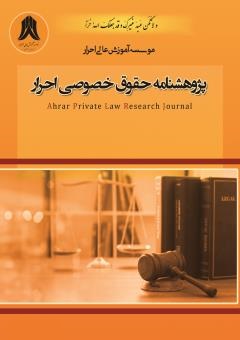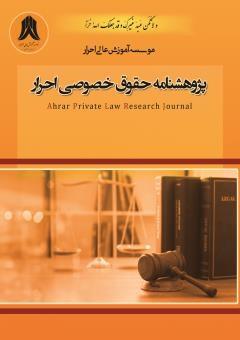A Reflection On The Positive Principle And Its Application In Iranian Jurisprudence And Law
Subject Areas : فقه و حقوق اسلامیBehnam Ghanbarpour 1 * , Seyyed Ali Jabar Golbaghi Masoleh 2
1 - Assistant Professor of Jurisprudence and Islamic Law, Department of Theology and Jurisprudence and Fundamentals of Law, Faculty of Humanities, Qaim Shahr Branch, Islamic Azad University, Qaim Shahr, Iran.
2 - Assistant Professor of Jurisprudence and Islamic Law, Department of Theology, Jurisprudence and Fundamentals of Law, Faculty of Humanities, Lahijan Branch, Islamic Azad University, Lahijan, Iran.
Keywords: Accessories, positive, works, principle, signs, rulings, religious.,
Abstract :
The meaning of the positive principle is the proof of the rational and common principles of the practical principles; But the discussion of positives is not limited to practical principles; Rather, it is also mentioned in other principles such as the principle of authenticity in other interpretations of signs. The necessity of research on the positive principle is that the positives and rational and Shariah requirements are of fundamental use in jurisprudence and subject law. And it can be the basis of the judge's decision in some cases; For example, if due to the immaturity of the contracting parties, there is doubt about the nullity of the transaction, By referring to the positives of the authenticity principle, it is possible to judge the authenticity of the transaction; Now this question is raised whether the rational, customary and normal principles of practice have also been taken into consideration by jurists and lawyers? The findings of the current research, which is organized in a descriptive and analytical method, indicate that the positive aspects of signs are evidence; But the positives are practical principles that are considered as apparent rules, And they are used in practice when in doubt, and in the real world they have no discovery of the truth. They do not have the ability to hold. As a result, the rational and customary positives of practical principles such as the principle of association and the principle of acquittal cannot be effective in judicial procedures and will not be invoked.
Akhund Khorasani, Mohammad Kazem,(1996), Kefayeh al-Asul, Al-Al-Bait Lahiya al-Tarath Institute,
Qom: 1996.
Imam Khomeini (RA), Al-Astsahhab,(2002), Imam Khomeini Heritage Editing and Publishing Institute,
Tehran: 2002.
Amini, Alireza, (2000),Doctoral topics in the field of jurisprudence and fundamentals.
Ansari, Sheikh Morteza, (2003), Faraid al-Asul, vol. 3, Majmaal al-Fikr al-Islami, Qom.
Jafari Langroudi, Mohammad Jafar,(2012), Legal Terminology, Ganj Danesh, Tehran.
Jaafari Langroudi, Mohammad Jafar,(2011), Encyclopedia of Islamic Judicial Sciences, Volume 1, Ganj
Danesh, Tehran.
Heydari, Ali Naghi,(2000), Principles of Inference, Qom Seminary Management Center, undated.
Hakim, Mohammad Taqi,(1979), Al-Asul al-Amee for Fiqh Al-Maqarn, Al-Al-Bait Institute, Qom.
Hakim, Al-Sayyid, (2007),Al-Kafi Usul Fiqh, vol. 2, Dar al-Hilal, Qom.
Khoei, Abu al-Qasim, Misbah al-Asul,(1991), vol. 3, written by: Seyyed Mohammad Sarwar, Al-Davari
School, Qom.
Sobhani, Sheikh Jafar,(1999), Al-Mojaz Fi Usul al-Fiqh, Al-Imam Al-Sadiq Institute, Qom.
Shahid Sani, (1992), al-Rawzah al-Bahiyeh, vol. 2, Islamic School of Education, Qom.
13-Sadr, Mohammad Baqer,(1994), Lessons in Fundamentals, vol. 1, first and second cycle, Islamic
Publishing Institute, Qom.
Sadr, Muhammad Baqir, (1987),Darus fi ilm al-usul, vol. 2, third volume, Majmaal al-Shaheed Ayatollah
Sadr.
Salehi Mazandarani,(2004), Miftah al-Asoul, vol. 4, Salehan Publishing House, Qom.
Salehi Mazandarani,(2009), Sharh Kefayeh al-Asul, Volume 7, Salehan Publishing House, Qom.
Mohamadi, Ali, (1992), Sharh Rasail, Vol. 5, Dar al-Fikr, Qom.
Naini, Fawad , (1988), al-Usul, Vol. 4, Al-Nashar Islamic Publishing House, Qom.
Valai, Isa,(1994), Annotative Dictionary of Usul Terms, Nei Publishing House, Tehran.

